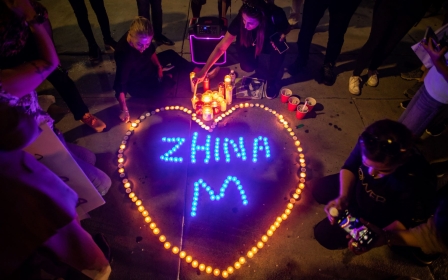Mahsa Amini: Activists accuse Iranian authorities of using Telegram 'snitch line' to track protesters

Activists have warned that the Iranian government has begun using Telegram, the hugely popular messaging app, to "identify and harm" protesters who have been marching on the streets.
Protests in the country have raged in the past week over increasing oppression by the "morality police", who enforce Iran's mandatory headscarf law on women. The death of Mahsa Amini, after she sustained injuries while in police custody for wearing improper hijab, sparked the latest protests, which have left at least 17 people dead, according to official figures.
The Telegram channel called Setade114, which has been linked to the Iranian government, has garnered almost 20,000 subscribers, in what activists are calling a "snitch line".
"Telegram is the third most used app and the second biggest social media app in Iran," said Mahsa Alimardani, a senior researcher for the Middle East and North Africa region at Article19, an organisation supporting freedom of expression and information around the world.
New MEE newsletter: Jerusalem Dispatch
Sign up to get the latest insights and analysis on Israel-Palestine, alongside Turkey Unpacked and other MEE newsletters
'There are several of these channels... it certainly is used to frighten people and protesters. Fear has been a tactic, including through SMS threats, to keep people off the streets'
- Mahsa Alimardani, senior MENA researcher, Article19
Alimardani, who is also an internet researcher focusing on freedom of expression and access to information online in Iran, told Middle East Eye that while Telegram is blocked in the country, many still access it with VPNs.
According to the Iranian government, more than 65 percent of the population over 15 have a Telegram account - more than 55 million people out of the country's 85 million population.
"It's a particularly thriving space for entities and content that get de-platformed or removed from Meta and Twitter, as there is almost no control or moderation oversight," said Mahsa.
Videos and photos disseminated on the Iranian-linked government account on Telegram have attracted hundreds of thousands of views, with the faces of protesters being prominently exposed.
"Militant and nefarious elements connected to or promoting the Islamic Republic or the security forces' narratives and goals can thrive," on platforms like Telegram, said Mahsa, adding that "especially Basij and IRGC, who are banned from posting on Instagram and most social media platforms."
The Basij, a paramilitary volunteer militia force, have been in the vanguard of suppressing the ongoing protests, alongside the Islamic Revolutionary Guard Corps (IRGC), a branch of the Iranian Armed Forces.
The fighting on the streets is only one element in frightening people away from protesting, Mahsa told MEE. The online space has become another such space.
Mahsa said "there are several of these channels" on Telegram collecting this data. "It certainly is used to frighten people and protesters. Fear has been a tactic, including through SMS threats, to keep people off the streets.
"Either they will arrest folks based on this tactic, or just scare them. Likely, looks like both."
To the dismay of many activists, Telegram has not responded to their requests to stop such messaging groups from being used to criminalise peaceful protesters.
"No emails are being responded to, and no action is being taken on reported materials that are causing active harm. It leaves us no choice but to publicly question them," said one activist online.
Signal's proxy request
The messaging app Signal put out a call for people around the world to help set up proxy servers after its service was banned in Iran, in an apparent attempt to push back on the ongoing protests over the death of Mahsa Amini.
As demonstrations have spread from city to city, encompassing a wide range of Iranian society, the government has restricted access to the internet and various messaging apps.
Instagram was blocked on Wednesday, followed by WhatsApp. At around 10pm, the local internet, known as the national internet, replaced the global one, which meant Iranians could only access locally based servers.
On Friday, Signal sent users a request to set up proxy servers to circumvent a ban on the app.
"If you set up a Signal Proxy and you want to let the world know, you can use the hashtag #IRanASignalProxy," it said in a statement.
The statement provides details on how to set up the proxy server, which currently can only be set up on the Signal Android app.
Middle East Eye delivers independent and unrivalled coverage and analysis of the Middle East, North Africa and beyond. To learn more about republishing this content and the associated fees, please fill out this form. More about MEE can be found here.




